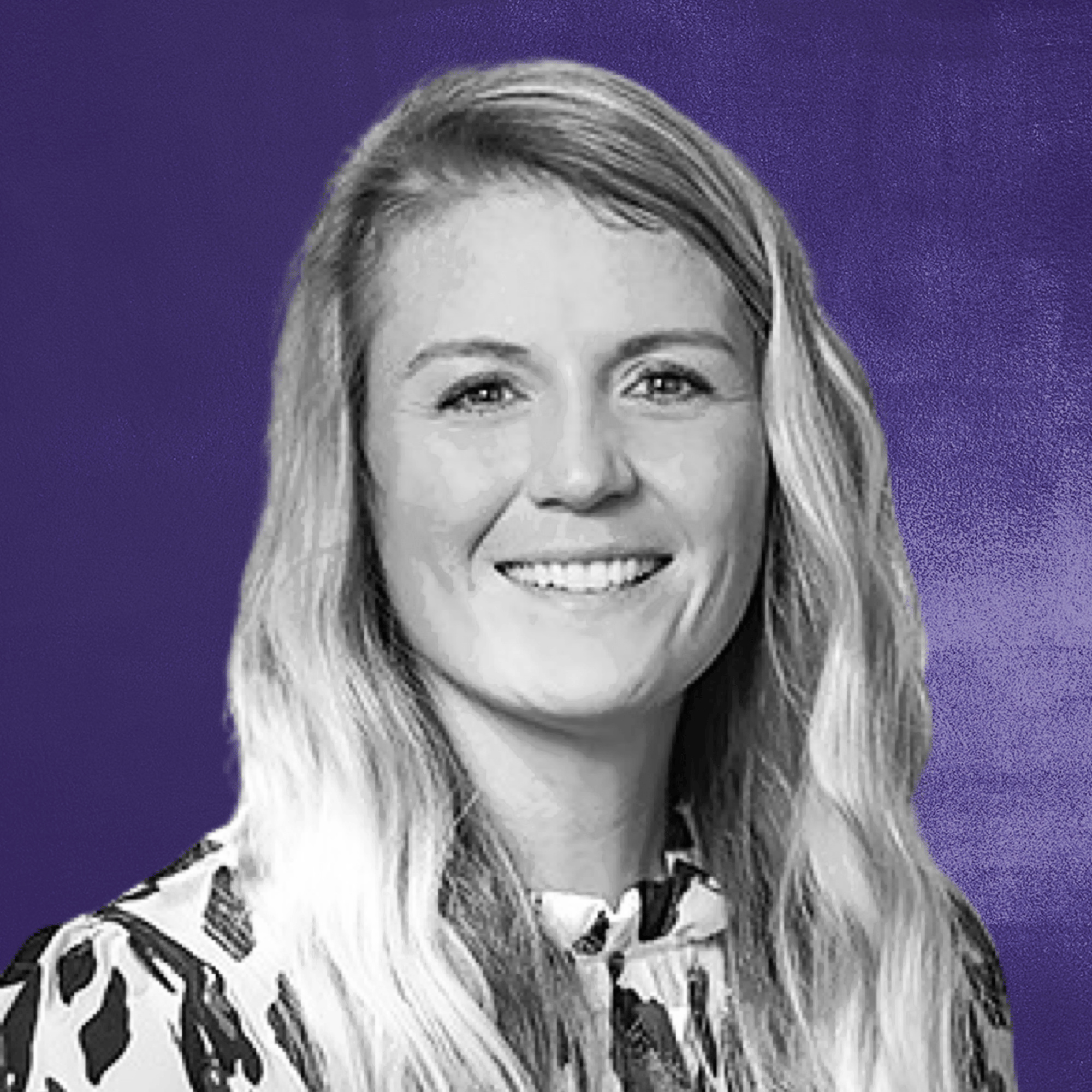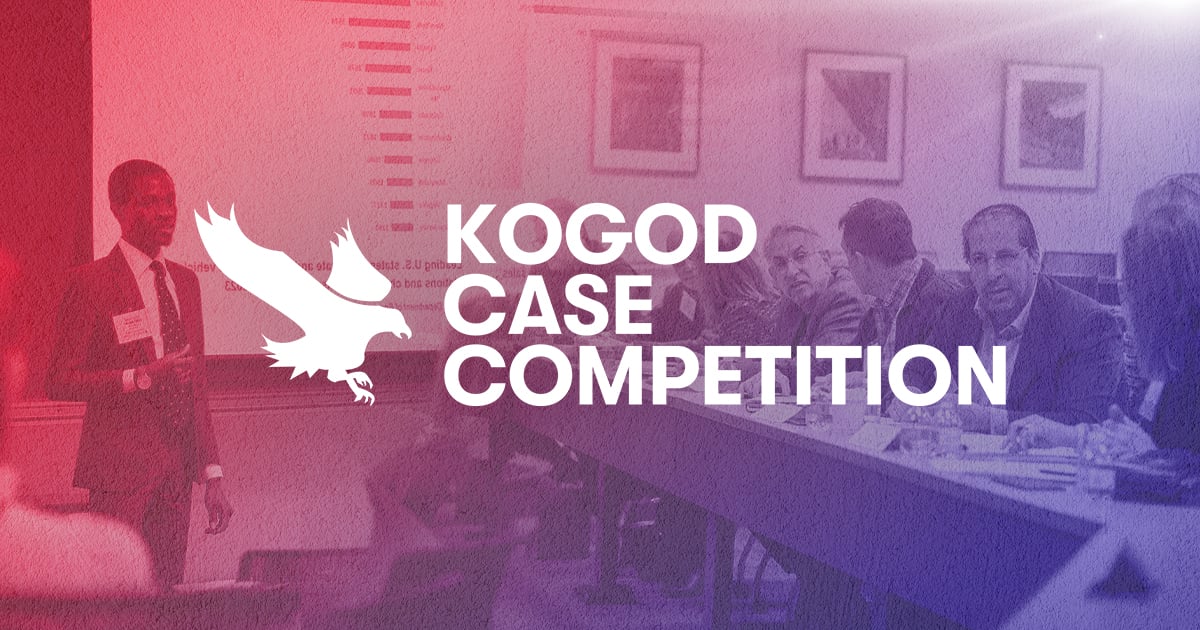
Jamie McCrary
Business schools across the country have increasingly prioritized student participation in case competitions. At some schools, student teams have started competing in as many as 10 case comps per year, which helps advance both their business savvy and careers.
At Kogod, Kelsey Wali, associate director of student development, and her team work hard to empower students to harness these opportunities.
Together with Kogod’s faculty and staff, Wali spearheads a new process to train and prepare students for case competitions systematically. It centers on synergy: Students are connected with a faculty advisor, receive feedback from the Center for Professionalism and Communications staff, and work with Wali to confirm competition logistics.
Students train and rehearse for months before their chosen competition, a move that helps solidify their teams early on.
Their efforts are paying off. This year, students have competed and placed in more case competitions than any year prior, earning awards in competitions such as Boston University’s $50k Sustainability Case Competition and the MIT Sloan Sports Analytics Conference Case Competition. Most recently, Wali’s undergraduate team placed third in Georgetown’s McDonough Business Strategy Challenge, the nation’s largest undergrad nonprofit case competition.
“I'm still impressed by the work we did together, even with the tight time constraints,” says Samuel Wardenburg, BSBA ’26, a McDonough team member. “I attribute my ability to stay calm during the presentation to the many hours of preparation we put in as a team; that preparation tested my ability to think on my feet. Forming a high-functioning team and collaborating toward an ambitious goal was meaningful.”
Continue reading for more from Wali, including what she envisions for Kogod’s case competition teams moving forward and how she hopes to engrain competing as a norm into the school’s culture.
Tell us more about the new process you helped develop to train and prepare Kogod students interested in competing in case competitions.
This year, we piloted a new preparation process that we’re excited to enhance for years to come. For external case comp teams—specifically the McDonough team—we started training months before the competition. The team’s faculty advisor, Professor Danielle Vogel, along with our partners at the Center for Professionalism and Communications, coached them through values work, a team agreement, storytelling tactics, and developing their presentations; I covered all logistical items for the competition and provided practice cases and case analysis frameworks, such as the Harvard Business School Case Analysis Module. As a final step, they presented their practice cases and received real-time staff feedback, simulating the competition’s presentation guidelines and judging.
What inspired you to spearhead this new approach?
In my previous role at George Washington University’s School of Business, I worked with colleagues and faculty to create a culture and a buzz around case competitions and their value-add to students’ education. We developed a process for students to apply to complete a case interview. If selected to compete in a competition, student teams would work with me and a staff or faculty coach for at least two months. As we sent teams across the country to various competitions, the process became highly competitive, and case competitions became a priority experience for students, staff, and faculty. And after seeing the diverse opportunities it helped bring students, I was inspired to build out these experiences here at Kogod.
What makes case competitions crucial for business students to participate in–particularly external case comps?
Case comps are experiential learning opportunities that are an integral part of business education and the workplace. They enhance students’ skill development and provide invaluable benefits, like expanding one’s professional network (particularly with employers), developing presentation, critical thinking, and problem-solving skills, and learning and applying case analysis frameworks, methodologies, and industry-based knowledge. As we increase our presence at external case competitions, our goal is to represent Kogod in a positive light and compete at the highest level.
How would you describe your vision for supporting case competition teams moving forward?
The overarching goal is twofold: Increase Kogod’s presence at case competitions among top-ranked business schools and employers and provide students with an opportunity to enhance their skill development and employability.
Case competitions provide real-world scenarios, workplace-simulated environments, and a chance to learn from a diverse range of other high-achieving students and accomplished judges from across industries."

Kelsey Wali
Associate Director of Student Development, Kogod School of Business
Ultimately, I want to engrain them in Kogod’s culture so that they are a common language for undergraduate and graduate students.
What impact do you hope this work will have on students’ careers and the Kogod community?
I want to increase students’ exposure to industry-specific content and work and help them network with a diverse pool of potential employers. Case competitions enhance students’ resumes: What an experience to discuss during interviews and prepare them for case-based interviews! Students participating in external competitions also connects our community to future opportunities such as internships and jobs.
How does this vision fit into the larger mission of the office and the business school itself?
Our vision to increase our presence at case competitions advances our Student Development mission to enhance our students’ intellectual development, leadership ability, communication skills, and professional self-confidence. Overall, providing these opportunities to students gives them hands-on learning and real-world scenarios to put Kogod’s mission into practice: To build a more sustainable world through business.
